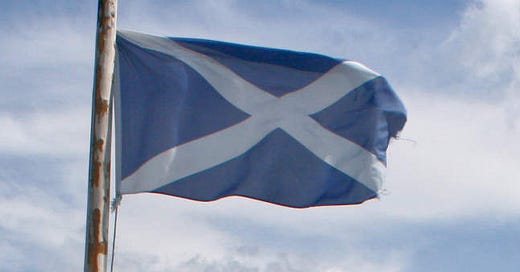Glasgow’s last public execution
Dr Edward William Pritchard was the last person publicly executed in Glasgow when hanged for poisoning both his wife, Mary, and his mother-in-law. His trial took place this week in 1865 and the evidence was so convincing that the jury took just an hour to find him guilty.
On the day of his execution - 28 July - the Express reported that nearly 100,000 spectators had gathered to watch the gruesome hanging, with the convict struggling for five minutes at the end of the rope before he eventually died.
Dundee man is Open University’s first head
Dundee-born Walter Perry was a co-founder of the Open University and its first vice chancellor. The idea behind the university was to make higher education available to all by teaching via television, radio, and traditional printed texts. He worked alongside Jennie Lee, after whom the university's building in Edinburgh was named.
Find out more about Walter Perry
Lady Glamis burned at the stake
Janet Douglas, Lady Glamis, was burned at the stake this week in 1537. She’d been accused of murder, witchcraft, and attempting to poison the king, James V.
Evidence had seemingly been hard to come by, and the king resorted to torturing members of her family and staff, who eventually gave him what he wanted, even if it was not necessarily the truth. Perhaps inevitably, she was convicted of treason and sentenced to death.
Brewer William McEwan born
Brewer William McEwan was born in Clackmannanshire this week in 1827, and died in London in 1913. During his life he both founded the Fountain Brewery and was the Member of Parliament for Edinburgh Central between 1886 and 1900.
Fountain Brewery found great success as a brewer of beer – particularly McEwan’s – which it sold both locally, as well as in England and overseas. Some exports went as far as Australia. Upon his death, the Daily Mirror called his brewery "one of the greatest businesses in the world".
Read more about William McEwan
Bank of Scotland formed
The Bank of Scotland was formed under the authority of the Scottish Parliament this week 1695, and went into operation the following February. It was the first bank to be established in Scotland, with the similarly named Royal Bank of Scotland not founded until 1727. It became the first bank in Europe to issue paper currency and the first UK bank to install a computer to process accounts centrally.
More about the bank's founding...
Edinburgh hosts Commonwealth Games
Prince Philip, the Duke of Edinburgh, welcomed almost 1,400 athletes from 42 countries to Edinburgh's Meadowbank Stadium this week in 1970 for the ninth Commonwealth Games.
Edinburgh had won the right to hold the games in 1966, after competing for the honour against Christchurch in New Zealand. Christchurch went on to host its own games four years later. Scotland hosted the Commonwealth Games again in 2014; on that occasion in Glasgow.
Scottish National War Memorial opened
The Scottish National War Memorial, which sits at the highest point within Edinburgh Castle, was opened to the public this week in 1927. It had been proposed during the First World War, and a team of architects was engaged in 1918 to draw up plans.
However, it took a further seven years for construction to begin. The memorial was opened by the then Prince of Wales, who laid a wreath on the Memorial before placing rolls of honour in a steel casket to be kept at the site.
Edinburgh designer born
William Henry Playfair left his mark on the Scottish capital. He graduated from the University of Edinburgh and, after working in London, returned to Edinburgh and designed many of the buildings for which he is remembered. These include the National Gallery of Scotland, the National Monument, and the building housing the Royal Scottish Academy.
He was born this week in 1790 and died in 1857 of an illness that left him partially paralysed. He is buried in Edinburgh's Dean Cemetery.
Scottish ships’ fateful South American expedition
The first ships headed off on a get rich quick scheme that may have contributed to the end of Scotland’s political independence this week in 1698. The Darien Expedition was headed for Panama under the authority of the Company of Scotland to administer an overland route between the Atlantic and the Pacific.
It seemed like such a guaranteed moneymaker that Scotland's richest families invested heavily, and they were left with enormous losses when the so-called Darien Scheme failed. Finding themselves out of pocket, the moneyed classes petitioned for a union with England in exchange for compensation.
Find out how the expedition changed Scotland forever
Death of Glasgow’s Paraffin Young
James Young, who was born in Glasgow in 1811, discovered paraffin oil when he noticed that oil dripping from the roof of a coal mine could be distilled and separated, the result of which could be used as fuel.
He was awarded a patent for his process and set up a refinery at Bathgate. In the mid-1860s, he set up a second plant at Addiewell. He soon had the nickname Paraffin Young. The first manufacturing chemist to produce oil from coal, he died this week in 1883.
Find out more about Paraffin Young



